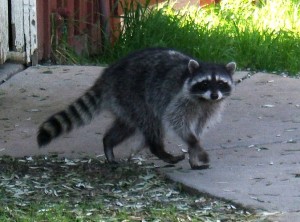Wild Raccoon Behaviour in Rural Areas
Posted on | Comments Off on Wild Raccoon Behaviour in Rural Areas
 Raccoon are native medium sized mammals measuring 3 feet long, bushy and has a black and yellowish white ringed tail. Its body weighs between 3.5 to 9 kilograms they have a hunched like appearance when they move since their front legs are usually longer that their hind legs. They have a grayish coat, which has under fur that insulates it against the cold. Raccoons have adapted to live anywhere from the wild to urban areas Owing to hunting, their population in the urban areas can get large. In rural areas, their population is found between one and foursquare kilometers. They eat anything edible from vegetable to flesh Food and habitat . For more information you can visit the specialist site at Brampton raccoon removal services.
Raccoon are native medium sized mammals measuring 3 feet long, bushy and has a black and yellowish white ringed tail. Its body weighs between 3.5 to 9 kilograms they have a hunched like appearance when they move since their front legs are usually longer that their hind legs. They have a grayish coat, which has under fur that insulates it against the cold. Raccoons have adapted to live anywhere from the wild to urban areas Owing to hunting, their population in the urban areas can get large. In rural areas, their population is found between one and foursquare kilometers. They eat anything edible from vegetable to flesh Food and habitat . For more information you can visit the specialist site at Brampton raccoon removal services.
Raccoons are nocturnal hence they begin their search for food after sunset and they will continue until when morning approaches. Raccoons love food from the corn but they are also huge fans of corn, fruits, and nuts. Insects and vertebrates are its food for spring while in summer they prefer feeding on sweet potatoes. sweet corn, and melons. They also enjoy feeding on fruits. They are also usually seen hunting frogs turtles and other small animals. During fall, corn becomes their main source of food. In rural areas where corn is grown, they form colonies for the purpose of food security. They will also go for fruits that have fallen down from the trees. For instance, they love cherries and grapes. Their thick fur offers them security against bees sting as they consume their honey and plant saps. In rural areas, wild raccoons prefer hollow trees and logs as their homes.
Hibernation
Raccoons do not have a hibernation phase. However, they reduce their activities during winter. Just like other animals, they accumulate calories in the form of fats in their body. When winter approaches the progressively reduce their activity while they consume the reserved fat for their body activity Raiding
Wild raccoon behavior in rural areas is nothing compared to that in urban areas. In rural areas, raccoons turn out to be a nightmare to domestic egg laying animals. There are reports of how raccoons attack the egg laying animals and a times how they steal the eggs. This is one of the reason raccoons are huge enemies of rural dwellers.
Reproduction
Raccoons breed mostly between January and March. Male raccoons are territorial dominant hence they mate with more than one mother. The female raccoon is bestowed the responsibility of taking care of the young one. A female raccoon is expected to give birth to 1 -8 cubs each ear. The cubs take an average of 6 to 9 weeks before they start exploring the world. During this time, they will have learnt how to eat the normal raccoon foods. Raccoon cubs stop weaning by the 16th week Natural instinct
Raccoons are nocturnal but they will still be seen during the day hunting for food. Male raccoons will always be seen in groups except during mating.
Human-raccoon conflict
As urbanization expands in and around Toronto, more residents experience problems with raccoons. The city is expanding in all directions and raccoons and other critters are losing their natural habitat. As the city expands eastward more and more people are dealing with raccoons in their attics, dens and soffits. For example the eastward expansion of Toronto has caused many problems. Oshawa, Pickering and Ajax are a few areas with significant raccoon problems. There are raccoon removal professionals that offer removal and proofing solutions. But there are things you can do as well.
Raccoons and humans have conflicts repeatedly. Raccoons are animals and like humans, they have their needs. Some of their basic needs are water, food, and shelter. Raccoons in rural areas have a home range between 1 and 4 km square. A home range is the area an animal uses for water, food, and shelter in its normal day’s movements. Raccoons go into human homes especially in places where they grow corns and fruits and rear domestic fowls like chicken. They steal their eggs, animals and destroy properties like garbage Remedy
- Do not feed raccoons
- Keep pets indoors at night
- Prevent raccoons from entering pet doors
- Put food in secure compost and clean up the food remnants Keep the garbage close all the time
- Construct secure roost for the domestic fowl